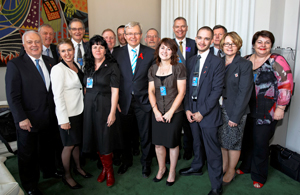The Australian Government welcomes the new international commitments that will reinvigorate the global HIV response. The commitments form part of the Political Declaration on HIV and AIDS adopted at the United Nations High Level Meeting on AIDS held in New York from 8-10 June.
While extraordinary gains have been made in the last 30 years, more than 30 million people have died from AIDS and another 33 million people are living with HIV.
The Political Declaration on HIV and AIDS: Intensifying our Efforts to Eliminate HIV and AIDS includes targets to reduce the sexual transmission of HIV and transmission of HIV among people who inject drugs by 50 per cent by 2015. It also commits governments to increase the number of people receiving life saving treatment from 6 million to 15 million and to work towards eliminating mother-to-child transmission by 2015.
In delivering Australia's national statement, Foreign Minister Kevin Rudd said the Declaration will make a difference because it commits governments to bold new targets and recognises those groups who are most vulnerable, including men who have sex with men, people who inject drugs, sex workers and women, girls and infants.
'It calls on us all to meet the resources gap if we are to turn around the reality we still confront today–that new infections continue to outpace the availability of treatment,' Mr Rudd said.
Mr Rudd announced an additional $11 million to extend Australia's partnership with the Clinton Health Access Initiative in Papua New Guinea to reduce the number of children born with HIV.
Australia played a key leadership role in the meeting, with Australia's Ambassador and Permanent Representative to the United Nations Gary Quinlan co-facilitating the negotiations of the Declaration with his counterpart Ambassador Charles Ntwaagae of Botswana.
The three day meeting was attended by more than 3000 delegates from government and civil society.
The Australian delegation, headed by Mr Rudd, included representatives from civil society organisations including from communities most-affected by HIV, legal and medical experts, parliamentarians and government.
This year marks a number of significant milestones in the global response to HIV. These include 30 years since the first case of AIDS was reported, 10 years from the landmark '2001 UN General Assembly Special Session on HIV/AIDS' and the 'Declaration of Commitment', and five years from the '2006 High Level Meeting', where commitments to universal access to HIV prevention, treatment, care and support were made.
To commemorate these anniversaries and highlight Australia's domestic and international HIV response over the past decade, a booklet 'Keeping Our Commitment, Australia's support for the HIV response' is now available below.
More information
- Keeping Our Commitment–Australia's support for the HIV response
- HIV/AIDS: Australia's response
- Political Declaration on HIV and AIDS: Intensifying our Efforts to Eliminate HIV and AIDS [external site]
- A video of the statement and the Minister's meeting with the delegation [external site]
- Security Council Resolution 1983 [external site], adopted on 7 June 2011, on the inclusion of HIV prevention, treatment, care, support in implementing peacekeeping mandates.
- UNAIDS [external site]

